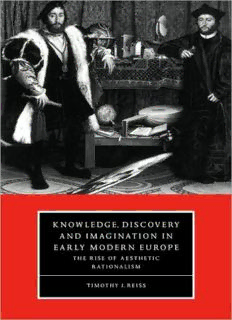
Knowledge, Discovery and Imagination in Early Modern Europe: The Rise of Aesthetic Rationalism PDF
Preview Knowledge, Discovery and Imagination in Early Modern Europe: The Rise of Aesthetic Rationalism
Recent explanations of changes in early modern European thought speak much of a move from orality and emphasis on language to print culture and a 'spatial' way of thinking. Timothy J. Reiss offers a more complex explanation for the massive changes that occurred. He describes how by the late fifteenth century the language arts of the trivium had come to seem useful only for communi- cation, teaching and public debate, and how humanists turned to the mathematical arts of the quadrium - including music - to enable new means and methods of discovery. Reiss goes on to argue that the new 'mathematical' ideal formed the basis of wide sociocultural renewal; he analyzes Northern vernacular grammars, examines the work of French and Italian mathemati- cians, musicians and philosophers including Descartes, and censures such modern commonplaces as the supposed impact of print and 'spatial' thinking. He ends by exploring the broad impact of this 'mathematization' of the Western imagination. Cambridge Studies in Renaissance Literature and Culture 15 Knowledge, discovery and imagination in early modern Europe Cambridge Studies in Renaissance Literature and Culture 15 General editor STEPHEN ORGEL Jackson Eli Reynolds Professor of Humanities, Stanford University Editorial board Anne Barton, University of Cambridge Jonathan Dollimore, University of Sussex Marjorie Garber, Harvard University Jonathan Goldberg, Duke University Nancy Vickers, University of Southern California The last twenty years have seen a broad and vital reinterpretation of the nature of literary texts, a move away from formalism to a sense of literature as an aspect of social, economic, political and cultural history. While the earliest New Historicist work was criticized for a narrow and anecdotal view of history, it also served as an important stimulus for post-structuralist, feminist, Marxist and psychoanalytical work, which in turn has increasingly informed and redi- rected it. Recent writing on the nature of representation, the historical construction of gender and the concept of identity itself, on theatre as a polit- ical and economic phenomenon and on the ideologies of art generally, reveals the breadth of the field. Cambridge Studies in Renaissance Literature and Culture is designed to offer historically oriented studies of Renaissance liter- ature and theatre which make use of the insights afforded by theoretical perspectives. The view of history envisioned is above all a view of our own history, a reading of the Renaissance for and from our own time. Recent titles include Anxious masculinity in early modern England MARK BREITENBERG Seizures of the will in early modern English drama FRANK WHIGHAM, University of Texas at Austin The emergence of the English author: scripting the life of the poet in early modern England KEVIN PASK, Concordia University The poetics of English nationhood, 1590-1612 CLAIRE McEACHERN, University of California, Los Angeles Textual intercourse: collaboration, authorship, and sexualities in Renaissance drama JEFFREY MASTEN, Harvard University A complete list of books in the series is given at the end of the volume. Knowledge, discovery and imagination in early modern Europe The rise of aesthetic rationalism Timothy J. Reiss New York University CAMBRIDGE UNIVERSITY PRESS CAMBRIDGE UNIVERSITY PRESS Cambridge, New York, Melbourne, Madrid, Cape Town, Singapore, Sao Paulo, Delhi Cambridge University Press The Edinburgh Building, Cambridge CB2 8RU, UK Published in the United States of America by Cambridge University Press, New York www.cambridge.org Information on this title: www.cambridge.org/9780521582216 © Timothy J. Reiss 1997 This publication is in copyright. Subject to statutory exception and to the provisions of relevant collective licensing agreements, no reproduction of any part may take place without the written permission of Cambridge University Press. First published 1997 A catalogue record for this publication is available from the British Library Library of Congress Cataloguing in Publication data Reiss, Timothy J., 1942- Knowledge, discovery, and imagination in early modern Europe: the rise of aesthetic rationalism / Timothy J. Reiss. p. cm. — (Cambridge studies in Renaissance literature and culture; 15) Includes bibliographical references and index. ISBN 0 521 58221 0 (hardback) - ISBN 0 521 58795 6 (paperback) 1. Language and culture - Europe - History - 16th century. 2. Europe - Intellectual life. 3. Renaissance. I. Title. II. Series P35.5.E85R45 1997 940.2'32-dc20 96-24764 CIP ISBN 978-0-521-58221-6 hardback ISBN 978-0-521-58795-2 paperback Transferred to digital printing 2008 For Matthew, Suzanna and Justin Contents Prologue and acknowledgements page xi A note on the text xix Introduction 1 Part 1 Problematizing the language arts 1 Grammarians' dreams 19 2 Grammarians' nightmares 45 Part 2 Passages 3 Rhetoric and politics 73 4 Method and knowledge 101 Part 3 Mathematics, music and rational aesthetics 5 Quadrivial pursuits 135 6 Bridging effects 155 7 Musical elaborations 169 8 Well-tempered imagining 188 Bibliography 201 Index 227
Description: